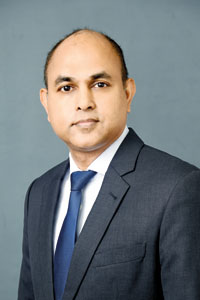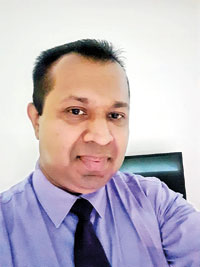News
Safeguarding the kidneys
View(s):By Kumudini Hettiarachchi
Many do not give a thought to these two bean-shaped organs, each the size of a fist, nestling on either side of the spine, just below the rib cage.
The realization of their value dawns only when they are in trouble, as the kidneys perform the important task of removing waste from the blood and returning the cleaned blood to the body.
This is why the need to prevent kidney disease is being shouted from the rooftops by the President of the Sri Lanka Society of Nephrology (SLSON), Prof. Eranga Wijewickrama, as World Kidney Day is celebrated on Thursday (March 14).
The SLSON has organized numerous activities including a Kidney Walk to drive home the point of safeguarding one’s kidneys. With the theme of ‘Let’s unite to protect our kidneys’, this Consultant Nephrologist who is attached to the Department of Clinical Medicine, Faculty of Medicine, University of Colombo, points out that most people do not know that their kidneys are in trouble as symptoms come quite late in the day.

Prof. Eranga Wijewickrama
Some of the major risk factors for kidney disease are:
- Diabetes
- High blood pressure or hypertension
- Exposure to nephrotoxic drugs and substances
Prof. Wijewickrama stresses that those suffering from diabetes or hypertension need to keep these diseases under tight control, taking their medicines scrupulously and controlling their diet through lifestyle modifications. When diabetes and hypertension are controlled there is a significant lowering of the risk for kidney disease.
Referring to nephrotoxic drugs, he urges people not to buy over-the-counter non-steroidal anti-inflammatory drugs (NSAIDs) or just because someone else is taking them, pop them at will. These NSAIDs include diclofenac sodium, ibuprofen, naproxen and mefenamic acid and should be taken only under medical advice and prescription. Even when prescribed by a doctor, long-term use is not advisable without strict evaluation by the doctor.
“This is while exposure to nephrotoxins could come in different forms – as supplements, vitamins, native treatment, skin applications and even with skin whiteners which could contain heavy metals,” he says, citing the example of how very high doses of Vitamin C, which many think is harmless can cause kidney injury. Sometimes fruit such as star-fruit could also be nephrotoxic.
Drink adequate amounts of water to keep dehydration at bay, Prof. Wijewickrama also advises, especially by those who engage in sports, exertion or manual labour in the searing heat.
How can a person recognize kidney disease?
“Usually, kidney disease manifests symptoms quite late, almost at the point when the kidneys have failed,” says Prof. Wijewickrama, pointing out that for early detection, the only answer is a simple blood test to check creatinine levels and a urine test for micro-albumin. This could be done routinely once a year.
In the unfortunate event of being diagnosed with kidney disease, he says that the patient should take action to protect whatever functions are left of the kidneys, as over time they would decline progressively.
“Here too the patient would need to control his/her diabetes and hypertension, prevent exposure to nephrotoxic medicines and substances and monitor kidney disease under specialist care,” he adds.
| Myths & misconceptions around kidney disease There is a major myth that if you are suffering from kidney disease, you should drastically restrict or cut out altogether the intake of protein such as meat, fish and egg, while eating only such vegetables as rabu (radish). This is a fallacy, stresses Prof. Eranga Wijewickrama, as a protein deficiency in the diet would lead to malnourishment. This, in turn, would lead to a drop in creatinine, which is misconstrued as “good” but it happens because of muscle-mass reduction and not due to recovering from kidney disease. So it is bad. Looking at a typical plate of rice of a Sri Lankan, he points out that “we don’t eat high-protein diets, only a small piece of fish or meat or an egg. If we stop eating this little protein, we can become malnourished”. He says that another major misconception is that the medicine prescribed for diabetes, metformin, is nephrotoxic. This is an absolute fallacy as not controlling diabetes is a huge risk factor for kidney disease. Metformin, like any medication, needs to be taken under the advice of a doctor. Strongly advocating against falling victim to spurious claims by several groups that kidney disease can be “cured”, Prof. Wijewickrama is adamant with proof that such claims are false. Regrettably, patients waste valuable time trying out so-called cures. Such loss of time would compel them to undergo dialysis for a long period thereafter, whereas they could have gone directly for a kidney transplant, he says, adding that with the passing of time, trying out these false claims, they also become exposed to infection and get weaker. “So don’t try out this and that. Follow time-tested science and medical protocols,” he adds.
| |
| Childhood kidney disease is curable, so get early treatmentThe message is loud and clear – childhood kidney disease, if diagnosed early and treated properly, is curable.This is what Professor in Paediatric Nephrology at the Faculty of Medicine, University of Colombo, Prof. Randula Ranawaka highlights as World Kidney Day with the global theme of ‘Kidney Health for All – Advancing equitable access to care and optimal medication practice’ is celebrated next Thursday.While assuring that Sri Lanka has facilities on par with developed countries to treat childhood kidney disease, this Consultant Paediatric Nephrologist who is also attached to the Lady Ridgeway Hospital (LRH) for Children, Colombo, ticks off such facilities. These facilities include haemodialysis and peritoneal dialysis and renal (kidney) transplant for end-stage kidney disease. In haemodialysis, the child’s blood is sent through tubes from his/her body into a dialysis machine where it gets filtred through a ‘dialyzer’ and is sent back into the body after the removal of waste and extra fluid.  Prof. Randula Ranawaka In peritoneal dialysis, a catheter sends the cleaning fluid, dialysate, into the child’s abdomen, with the tissues covering most of the organs in the abdomen (the peritoneum) acting as a filtre. Explaining that these facilities are available at the LRH and a few other state hospitals across the country, Prof. Ranawaka urges that parents should seek treatment as early as possible for their children. In Sri Lanka, with expectant mothers undergoing scanning early into their pregnancy, it is conducive to finding congenital abnormalities in the foetus early, according to him. The necessity once the baby is born is to follow-up, repeat such imaging and treat such a condition. He says that parents should also watch out for Nephrotic Syndrome, an early indication of which would be oedema (generalized swelling of the whole body) and frothy urine (a sign of protein in the urine). “Don’t delay seeing a doctor by following so-called other solutions, but bring the child to hospital, as Nephrotic Syndrome is easily treatable with a good prognosis,” he says. A few more danger signals of childhood kidney disease are red colour urine and frequent urinary tract infections (UTIs). Prof. Ranawaka cautions against ignoring even once if a child passes red colour urine as it could be due to an underlying disease affecting the kidneys. UTIs too need to be checked out to ascertain why they are occurring. Referring to the importance of nourishment, he underscores that both obesity and malnourishment can impact on a child’s kidneys. This is while CKD presents with birth deformation, growth retardation, anaemia, loss of appetite and loss of weight. Early diagnosis, referral and treatment will help the child to have a good quality of life and no disruption in his/her education. Many people do not know that children could be recipients of both live kidney donation and cadaveric donation programmes. Prof. Ranawaka urges the setting up of a Registry of those suffering from CKD, while requesting adequate dialyzer units and Continuous Renal Replacement Therapy (CRRT) circuits to maintain facilities. |
The best way to say that you found the home of your dreams is by finding it on Hitad.lk. We have listings for apartments for sale or rent in Sri Lanka, no matter what locale you're looking for! Whether you live in Colombo, Galle, Kandy, Matara, Jaffna and more - we've got them all!

